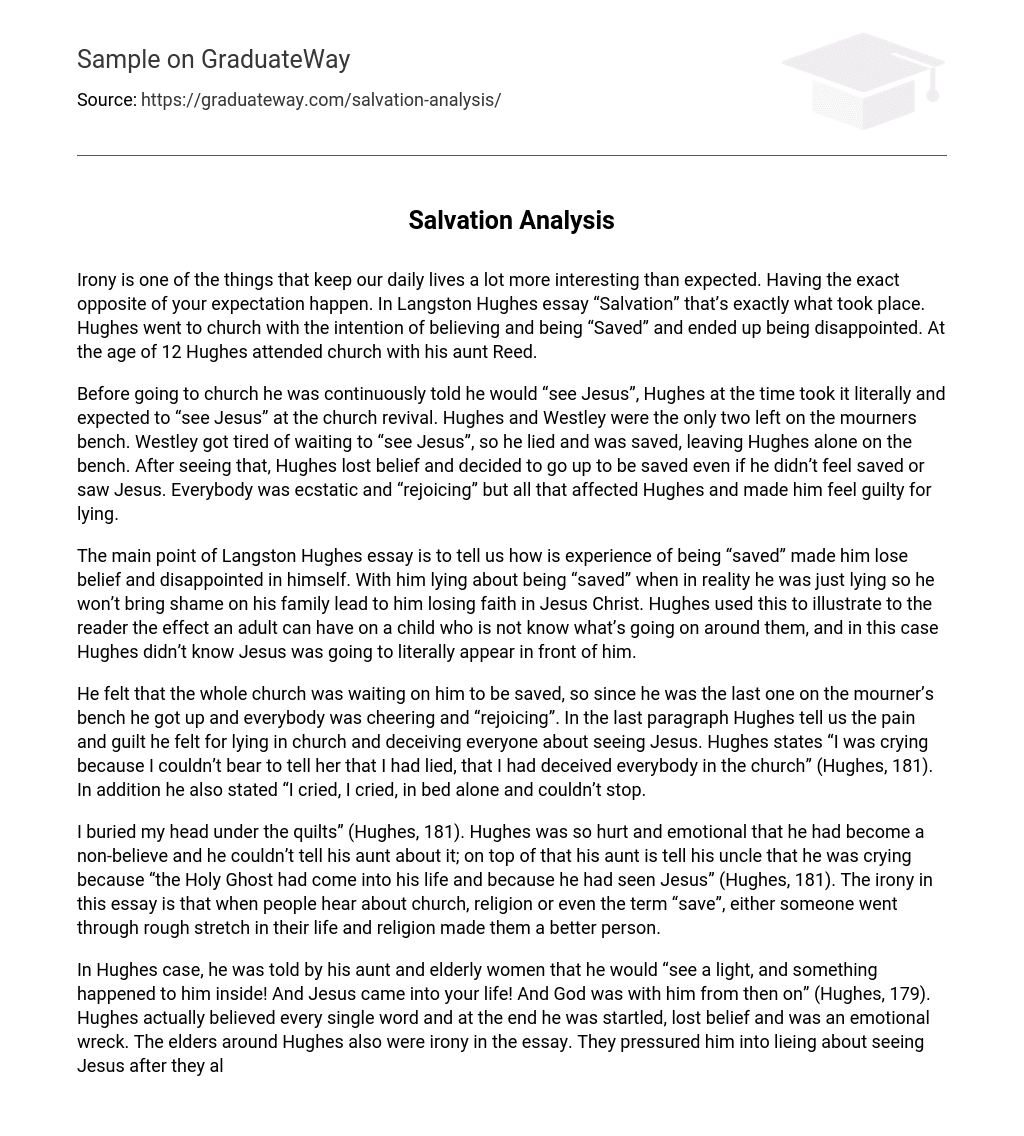Irony adds an unexpected twist to our daily lives, making them more interesting. This is evident in Langston Hughes’ essay “Salvation,” where he experiences the opposite of what he had anticipated. Hughes, who was twelve years old at the time, accompanied his aunt Reed to church with the sole purpose of finding faith and being “Saved.” However, to his dismay, he left feeling disappointed.
Before going to church, Hughes was repeatedly told that he would “see Jesus”. At the time, he took this literally and expected to actually “see Jesus” during the church revival. Hughes and Westley were the only two people remaining on the mourners bench. However, Westley grew tired of waiting to “see Jesus” and decided to deceive others by claiming to be saved. This left Hughes alone on the bench. After witnessing this, Hughes lost his belief and decided to go up and be saved, even if he didn’t feel saved or actually saw Jesus. The reaction from everyone else was one of great excitement and rejoicing, but this only made Hughes feel guilty for lying.
Langston Hughes’s main message in his essay is to convey how his experience of being “saved” caused him to lose faith and feel disappointed in himself. By falsely claiming to be “saved” in order to avoid bringing shame upon his family, Hughes ultimately lost his belief in Jesus Christ. Through this story, Hughes aims to show readers the impact that adults can have on children who are unaware of the events taking place around them. In this particular situation, Hughes had no way of knowing that Jesus would literally appear before him.
The narrator believed that the entire church was relying on him to find salvation. As he was the final person remaining on the mourner’s bench, he stood up and received cheers and “rejoicing” from everyone. In the concluding paragraph, Hughes expresses the pain and guilt he experienced for dishonestly claiming to have seen Jesus in church. Hughes confesses, “I was crying because I couldn’t bring myself to confess that I had lied and deceived everyone in the church” (Hughes, 181). Additionally, he mentions, “I sobbed and sobbed, alone in bed and unable to cease.”
Hughes expresses his emotions and disbelief by burying his head under the quilts (Hughes, 181). Despite his hurt, he keeps his doubts to himself, unable to confide in his aunt. She, in turn, mistakenly informs his uncle that he was crying because of a spiritual encounter with the Holy Ghost and Jesus (Hughes, 181). The irony lies in the fact that people often associate church, religion, and salvation with transformative experiences that improve their lives, usually after going through difficult times.
In Hughes’ situation, his aunt and other elderly women informed him that he would experience a revelation, a personal encounter with Jesus resulting in His presence being with him forever (Hughes, 179). Interestingly, Hughes wholeheartedly accepted their words, but eventually, his faith was shattered, leading him to become distressed and emotionally unstable. The elders who surrounded Hughes in this narrative were also ironic figures. They coerced him into dishonestly claiming that he had seen Jesus, utilizing their united presence to pray and sing solely for him, thus placing him in the center of attention.
Hughes’s story highlights the contrast between two generations. The elder women and his aunt did not anticipate Hughes taking their statement “you would see Jesus” literally; rather, they meant it in a spiritual and emotional sense. On the other hand, Hughes and Westley believed that they would physically see Jesus. However, while Westley accepted this notion, Hughes reacted emotionally and lost his faith.
Work Cited
- Hughes, Langston, “Salvation”, 50 Essays: A Portable Anthology. Third Edition. Samuel Cohen.





